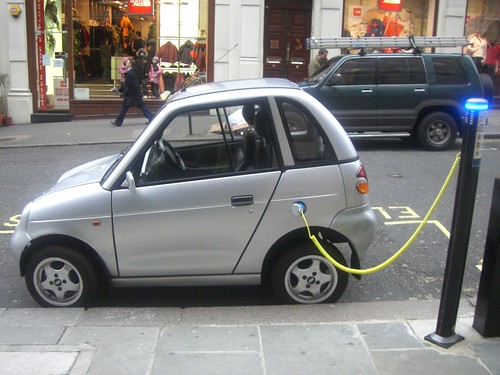How the EU supports low-emission vehicles
After the cities of York and Manchester in the UK started rewarding drivers of low-emission cars, private companies caught on. Today, a garage operator in Rotterdam, Netherlands is now giving a 40 cent/hour discount to drivers of relatively clean vehicles. The garage operator, Interlink, checks license plates of cars to ensure that they produce under 100 grams of CO2 per kilometer. Interlink uses a license plate recognition system in partnership with the government.
York offers a 50% discount on some parking charges to low emission vehicle drivers. Manchester’s “green badge parking” scheme offers drivers a 25% discount on annual season ticket at city center car parks.
Parking is just one way that both private and public entities in the EU are trying to increase demand for cars that pollute less.
In the U.S, Santa Monica allows electric cars and vehicles with low or zero emissions to park free, and the government has offered some tax breaks for some low-emissions vehicles in the past, but by and large the programs are spotty and subject to change.

Electric cars park free in Santa Monica. Image by Frank Hebbert
Cars that pollute more pay more in the EU
Madrid, Spain is killing two birds with one stone by using smart meters that charge parking rates that depend on the car’s age. The city gives a 20% discount to hybrids, while a diesel car manufactured in 2001 pays 20% over the usual parking fee. Electric cars park for free.
“Particularly for those who have cars that pollute, we hope that having to pay more will make people think twice before using them,” says Elisa Barahona, head of Madrid’s sustainability division.
Countries use taxes to encourage purchase of low emission cars
France used taxes in 2008 to incentivize purchase of low-emission cars and dissuade those wanting to purchase inefficient cars. High-emission car buyers have to pay a one time fee of €200-€2,600, while low-emission vehicles get a refund of €400 to €5000. By the following year, carbon dioxide emissions of all new cars sold had reduced from 149 grams per kilometer to 133 grams per kilometer.
Germany, Norway and Sweden also use taxes to discourage buying vehicles with higher emissions, and have seen a reduction in CO2 levels. “In Norway, we have the carbon tax on fuel, and the registration tax is linked to carbon emissions… A higher tax was introduced for diesel vehicles without factory-installed particle filters,” says the Ministry of Finance’s communications Runar Malkenes.
EU motivator for low-emission car perks
Often, regulations member governments have to adhere to, prompt such measures. Madrid’s smart meters are likely an effort to soothe the European Union (EU), according to Mariano González of Ecologists in Action. The EU has said that it could impose heavy fines if the city’s air quality does not get better.
France also introduced the onetime bonus and tax on vehicles, partly to meet goals proposed by the EU. It plans to cut its carbon emission from vehicles by 20%, by the year 2020.
Related Posts
Category: Green Parking, Regulations

















